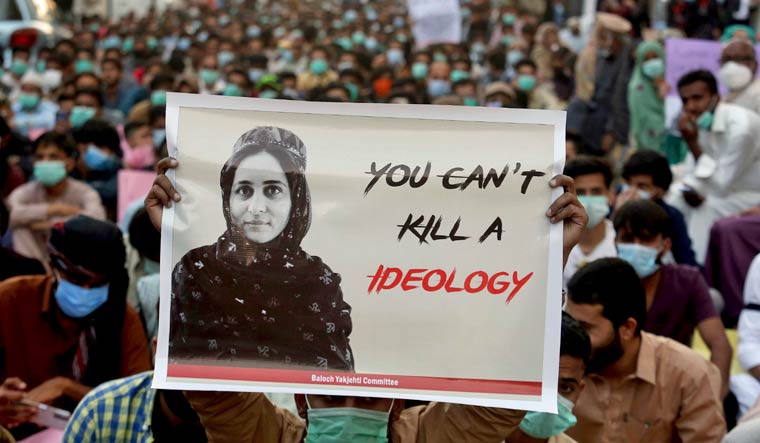The body of Karima Baloch, a 37-year-old Pakistani dissident from the ethnic Baloch community and a prominent women's rights activist, who died in mysterious circumstances while in exile in Canada, was brought home and buried in her village in the restive Balochistan province amid tight security, officials said on Monday.
Karima, who was highly critical of Pakistan's security agencies and campaigned extensively against disappearances and human rights violations in the troubled Balochistan province, was found dead in Toronto downtown waterfront on December 22.
Officials said that her immediate family was present at the funeral on Sunday in the Tump village of the Keach area of the restive province.
Security was tight due to the fear of protests by the Baloch nationalists who cherished her as their leader. Her supporters claimed on social media that the village was virtually sealed off so that people from other areas could not attend the funeral.
In some videos, people are seen requesting security forces to allow them to attend the funeral prayers.
Security sources said that mobile phone services were suspended in the area to avoid any untoward incidents as militants often use it to carry out acts of sabotage.
Toronto police have not treated her death as suspicious though there were allegations by her supporters that she was killed.
Her family members are not sure what happened. According to police in Toronto, her body was found near Lake Ontario, but no further details were given. Police said they did no believe there were any suspicious circumstances.
"The Toronto Police Service is aware of heightened community and media interest surrounding a missing person investigation," the force said in a statement. "The circumstances have been investigated and officers have determined this to be a non-criminal death and no foul play is suspected."
"The death of activist Karima Baloch in Toronto, Canada is deeply shocking and must be immediately and effectively investigated. The perpetrators must be brought to justice without recourse to the death penalty," Amnesty International South Asia said in a tweet last month.
Karima was highly critical of Pakistan's security institutions like her fellow nationalists who alleged that the federal government was exploiting the mineral resources while keeping the region impoverished. The charge is always rejected by the institutions.
She was living in Canada where she was granted asylum in 2016.
Karima, a critic of the Pakistani government and powerful military, had campaigned extensively against disappearances and human rights violations in Balochistan.
In 2016, she was named on BBC's list of 100 inspirational women. At 30, she was the first woman to become the leader of the Balochistan Student Organisation.
Pakistan She left Pakistan in 2015, after terrorism charges were levelled against her. Her family said she had been given death threats.
Her sister told the BBC Urdu service last month that Karima's death was "not only a tragedy for the family, but also for the Baloch national movement."
"She didn't go abroad because she wanted to, but because... open activism in Pakistan had become impossible," Mahganj Baloch was quoted as saying by the BBC Urdu service.





